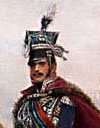It might be supposed that the disaster that befell the city of Moscow between the 15th and 17th of September would at least have convinced him [Napoleon] of Russian determination to continue the struggle. Instead he chose to regard it as the work of cranks and released criminals. Militarily, the catastrophe was of little significance. True , the fire did lead to a temporary breakdown in French discipline; while the Emperor retired to the comparative safety of the Petrowskoie Palace outside the city, his men broke bounds and engaged in an orgy of looting which resulted in thew wanton destruction of considerable quantities of food and other important material. In other respects, however, the fire was of little military importance. A quarter of the city survived the conflagration, including teh Kremlin, and consequently there was plenty of shelter for Napoleon's remaining 95,000 troops. The greater part of such supplies as Moscow contained (mostly luxury goods) also remained intact in the city's cellars. The true significance of the incendiaries' work lay in their motive rather than what they actually achieved. Their desperate action, which had been ordered by the Civil Governor Count Rostopchin, and not Kutusov, was really symbolic of the atmosphere of vendetta and grim determination that was beginning to pervade all strata of Russian society from the Tsar to the moujiks. This implication, which was appreciated by many of the more observant French officers, remained beyond the Emperor's willing comprehension.
Napoleon in a burning Moscow
~ D. Chandler, The Campaigns of Napoleon, p. 814-815























































2 comments:
Which only points to Russian madness that continues to this day - Burning a city rather than to allow the enemy to control it.
What is the madness that continues?
The policy of scorched earth has been used by many before and since the burning of Moscow.
Post a Comment